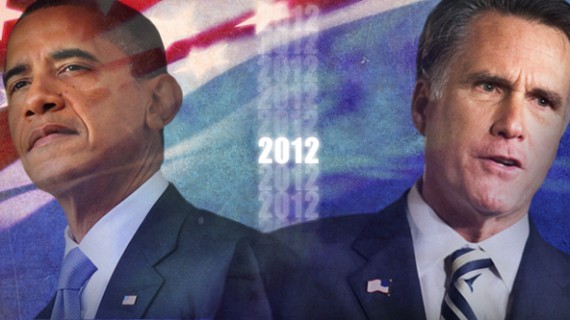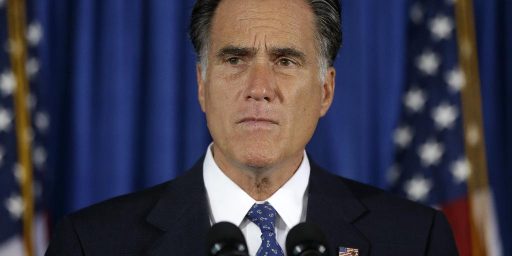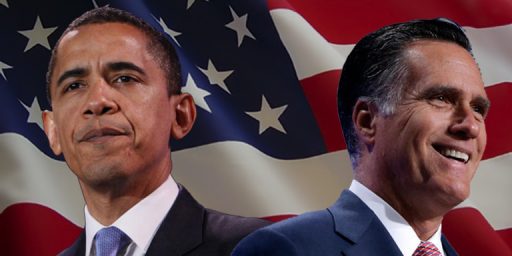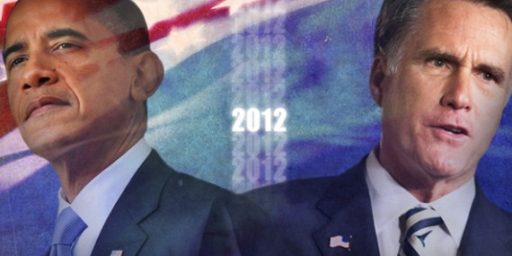Foolishly, Republicans Open Attack On Obama On Foreign Policy
Today's convention activities will include the opening salvos of an attack on the President's foreign policy. This strikes me as a mistake.
As some media outlets note the lack of any real talk of foreign policy at the Republican Convention, The Wall Street Journal reports today that the Romney campaign is preparing to take on the President on that very subject to an extent that they haven’t before:
TAMPA, Fla.—A presidential election dominated by jobs, debt and the size of government has left little room for foreign policy, but that is set to change as Mitt Romney and the Republicans turn their sights on President Barack Obama’s record overseas.
In a series of speeches starting with a Romney address Wednesday in Indianapolis, the Republicans will seek to portray the president as feckless and wavering in confronting threats in Syria, Iran, North Korea and China, Romney advisers said.
“In no region of the world is our influence stronger now than it was 3½ years ago,” said Alex Wong, Mr. Romney’s top foreign-policy adviser.
The attacks carry some political peril, as they pit a GOP ticket lacking foreign-policy experience against a president who gets high marks from voters on that front.
GOP critics will also go after Mr. Obama for alleged leaks of classified information by his administration and for supporting cuts to military spending that could take effect next year if Congress fails to reach a budget agreement.
The critiques, including prominent speeches here at the GOP convention Wednesday by Sen. John McCain (R., Ariz.) and former Secretary of State Condoleezza Rice, will mark a departure from a campaign largely focused on the country’s economic woes.
Richard Haass, president of the nonpartisan Council on Foreign Relations, said Mr. Romney faces a difficult challenge trying to elevate foreign policy as a prime election issue when voters are focused on problems at home. “The question is whether he should avoid the issue or try to raise the decibel level,” Mr. Haass said. “It appears he has decided to do the latter.”
In the speech today, Romney spoke to a group of veterans about restoring America’s “military resolve”:
On the evening of the biggest day in his political career, Mitt Romney previewed GOP convention speeches focused on the Republican plans for defense and foreign policy.
Romney pledged to return ”confidence in our cause, clarity in our purpose, [and] resolve in our might” to the American military in a Wednesday address to the American Legion in Indianapolis.
As is his custom, Romney emphasized that military issues and economic issues were inexorably connected, arguing that his policies would spur private sector growth and therefore make the military more secure.
This decision to go hawkish on foreign policy and attack the President strikes me as a rather odd strategy on the Romney campaign’s part.
For one thing, we already know thanks to endless polling that the primary issues that voters are concerned with right now begin and end with the economy and jobs and, to some extent, the Federal Government’s fiscal problems. Foreign policy barely registers on the list and, when it does, it’s typically a reflection of the general antipathy that Americans seem to have to military adventurism abroad after ten years of war in Afghanistan and Iraq. As I’ve said numerous times before, any moment that Republicans aren’t focused on the economy and jobs is a moment wasted, and it’s especially wasted in this case.
Second, as the Journal notes, Americans generally give the President high marks in the foreign policy area thanks in no small part to things such as the end of the Iraq War, the bin Laden raid, and Obama’s commitment to bringing an end to America’s combat role in Afghanistan. It seems unlikely that attacking the President in an area where he’s perceived as strong is going to accomplish much of anything. This is especially true when you consider the fact that this year’s Republican ticket is distinctly lacking in any real foreign policy experience, an historical anomaly for the Republican Party.
Finally, there’s the fact that many of the policies that Romney and other Republicans would advocate aren’t really supported by the public. At least publicly, Republicans have been highly critical of the President’s planned draw down in Afghanistan even though the public has overwhelmingly supported it. They have also been advocating more American involvement in the situation in Syria, a position that is not supported by as significant portion of the public. They want to massively increase defense spending — Mitt Romney is proposing $2 trillion in increases over ten years — in an era when Americans are saying that all aspects of the Federal Budget, including defense, should be on the table when it comes to cuts. The only aspect of Republican foreign policy that actually seems to coincide with public opinion is when it comes to support for Israel, although I doubt most Americans are as hawkish on that issue as your typical Republican.
Daniel Larison pointed out several days ago that Republicans seem to be pushing for a foreign policy election despite the fact that it’s actually a losing issue for them in the current political climate:
The only way to account for the Republican hawkish belief that Romney can “win” the foreign policy debate this year is that the hawks continue to believe the Iraq war was successful and wise. Republican hawks still don’t appreciate the extent to which the war and occupation completely discredited the GOP on foreign policy in the eyes of millions of Americans. They took a decades-old partisan advantage on these issues and destroyed it in the space of three years, and then didn’t realize that they had done any damage.
Because Romney insists on attacking Obama for not being hawkish and aggressive enough, he has little that he can coherently criticize, and when he does genuinely differ from Obama he tends to take ridiculous and untenable positions. Romney might gain some traction by criticizing Obama for escalating the war in Afghanistan, or by criticizing the slow pace at which U.S. forces are being withdrawn, but neither would have much credibility at this point. Romney is constrained by previous statements and his advisers from getting on the right side of public opinion on Afghanistan, and on everything else he is faulting Obama for not being confrontational and militaristic enough.
(…)
No politician ever won a debate by lecturing voters on how mistaken their views are. No doubt professional Republican hawks dislike aspects of Obama’s record, either because he has co-opted their policies or rejected their ideas. However, most Americans don’t consider it a failure that Obama has not entangled the U.S. in Syria’s conflict. If they think about it at all, that would be another reason for them to approve of Obama. Most Americans know little and care even less about Russia policy, but there are not many votes to be had in treating Russia as an enemy anymore. Even if Fly’s preferred policies were the right ones (and they definitely aren’t), they are undeniably not vote-winners. Romney has been foolish to follow the hawks in his policy statements, and he would be even more foolish to follow Fly’s political advice.
Larison was responding to a piece by Jamie Fly in Foreign Policy in which he argued this year’s election is similar to the 1980 fight between Ronald Regan and Jimmy Carter, and that Romney should attack Obama on foreign policy just as Reagan went after Carter:
There are many foreign-policy similarities between this year’s race and the one that ushered in the Reagan revolution and the end of the Cold War. And with a recent speech to the Veterans of Foreign Wars and his trip to Britain, Israel and Poland, Mitt Romney has begun outlining a foreign policy that embraces Ronald Reagan’s legacy. He has highlighted the Obama administration’s neglect of allies and its obsession with engaging enemies, and the resultant sense of an America adrift in a dangerous world.
(…)
Romney has begun to lay out an alternative vision. One that will replace “leading from behind” with actual American leadership and the resources necessary to ensure that this is another American century.
“Who does not feel rising alarm when the question in any discussion of foreign policy is no longer, ‘Should we do something?’, but ‘Do we have the capacity to do anything?’ The administration which has brought us to this state is seeking your endorsement for four more years of weakness, indecision, mediocrity and incompetence.” So declared Reagan in his acceptance speech at the 1980 Republican convention, and the words are as true today.
In that race, Reagan embraced the foreign-policy critique of President Carter. In their sole debate, Reagan noted, “[W]e cannot shirk our responsibility as a leader of the free world because we’re the only ones that can do it. Therefore, the burden of maintaining the peace falls on us. And to maintain that peace requires strength.”
Not a bad message for 2012. A neo-Reaganite foreign policy to undo the damage caused by four years of Barack Obama.
The problem with Fly’s argument, of course, is that this is not 1980. In fact, the world America faces in 2012, and the threats we have to deal with on a daily basis, are minimal compared to an ongoing Cold War, a rival Superpower that was funding a revolution in Nicaragua while it seemed to be expanded south into Afghanistan, and a hostage crisis half a world away that was making the nation seem weak an inept on a daily basis. Notwithstanding the arguments made by many of the advisers whispering in Romney’s ear, we remain the unparalleled military superpower in the world and its exceedingly unlikely that anyone is going to catch up with us any time soon even if we did implement defense cuts in the future. As far as the threats are concerned, they do exist but none of them are of a par with the Soviet Union, who had an entire invading army sitting on the other side of the Iron Curtain that descended across Europe. Foreign policy was an important issue in 1980 precisely because of those unique factors. Today, those kind of threats don’t exist, and American voters want to hear what these candidates are going to do here at home, not halfway around the world.
The biggest flaw in Fly’s argument, though, is the fact that he doesn’t seem to recognize that most of the issues he would have Romney emphasize in this foreign policy critique are precisely opposite the way the American public feels about this matter. Do Republican really think that the American people are going to want to hear a President put forward a hawkish, activist foreign policy while the country is in the middle of the world economic recovery in nearly 70 years as it still tries to recover from ten long years of war? Of course they won’t.
Finally, Walter Russell Mead points out that Romney is going about the challengers task in this area completely incorrectly:
[N]one of these problems make for the kind of barn-burning rhetoric that a presidential challenger needs. And many of the decisions for which the administration can be criticized would be very hard for any government to get right. The challenges posed by the Arab Spring (perhaps more correctly viewed asthe Sunni surge) are not easy to deal with. And if anybody has an answer to America’s Pakistan dilemmas, please tell the White House immediately.
Given all that, the most important task for a challenger in the field of foreign policy is to show the candidate as a serious statesman. Americans don’t want to be scared by their president. Criticizing Obama without looking wide-eyed or radical is the strategic challenge that Romney now needs to meet.
Precisely. If Romney, or Ryan, had extensive experience in foreign policy they might be in a position to make an argument like this, but neither of them does. Pushing these hawkish arguments now, when voters are clearly worried far more about the domestic situation, risks alienating the very independent voters they need to attract to win the election.







The GOP apparently doesn’t realize they blew a lot of their FP cred in Iraq. They expect to be able to beat a Democratic President over the head with the standard “weakling” attacks, when it’s patently obvious to anyone who looks that there’s just no there there.
They are apparently going with the Rove strategy of attacking their opponent’s greatest strengths, without realizing that such a strategy won’t work if it also highlights one their greatest weaknesses.
Furthermore, the only foreign policy differences the GOP can use are the desires of folks like Graham and McCain to start more big, ongoing wars. Nobody except those lunatics and their remaining neocon friends wants that.
Romney: “You’re a weakling on foreign policy!”
Obama: “You’re the party whose previous president failed to go after OBL. By contrast, I went after him, and we took him out.”
Case closed.
No Doug, it’s not foolish, it’s brilliant, brilliant I tell you. Going after Obama’s waffling and apologies and weakness will turn the election clearly in their favor. Please do anything you can to convey my opinion to Romney’s campaign.
More seriously: One, they’re not going after undecideds. It’s a turnout election and they’re trying to inflame the base. Two, is Romney campaigning directly to voters, or to donors? He figures if he can get enough money he can buy the votes.
How can they manage this without reminding everyone that the Romney FP team is essentially the Bush FP team redux?
If we werent suffering from complete collective amnesia, I’d say that focusing on a Romney FP platform would finally force us to have a discusson of the Bush II years, but I guess we should all know better by now.
In the end, it will always be the same old bullshit, and we will always be worse off for it.
@mantis:
This is exactly what I make of the situation, and I cant imagine what made whoever it was inside the Romney camp think that this was a good path to take.
If the Democrats were smart they would be going after Romney’s foreign policy – as Larison points out over and over he says a lot of things that are out of touch if not just stupid. In addition anyone who thinks they can cut taxes and increase defense spending is not a serious person.
You cannot use traditional logic here. You have to look at this through the post-truth prism that is before us. It is more of the same campaign tactics. So far, Romney’s whole campaign is based on a bed of lies regarding welfare, Medicare, whatever. Why not throw FP in the mix? After the media fails to correct the record, there will be voters who walk away and are convinced that 1) Obama has apologized for America, 2) Obama wants to cut defense spending to set the stage for Sharia Law and 3) Obama had nothing to do with the Bin Laden raid, in fact the “leaking of information” almost cost us our chance.
This is a zero sum game for Romney. Lie, lie, lie, lie, lie. Make more stuff up. The whole campaign is just a joke.
And of course the media gives him a pass with the he said/she said game.
Why leave any make-a-lie-out-of-it-stone unturned?
Whenever I want a truly conservative POV on foreign policy I look to Larison, and yeah, this particular post struck me as relevant when I read the title to this post.
Thank you, Doug.
(stay down Doug, breath deep, slow and easy, the feeling will return to your lower extremities…. Take your time. Shock is hard to deal with 😉
and yeah the GOP blew their (totally undeserving) foreign policy credentials with the invasion of Iraq.
I dunno, I’d say Romney has _great_ foreign policy experience. The official Romney Campaign Gaffe-of-the-Day (Sponsored by Chick-Fil-A!) is that he’s partying on a private yacht with his own personal fan club of $1mil donors. Problem is, the yacht, being a tax dodge itself, is registered in the Cayman Islands (and proudly flying the Cayman ensign off its stern). Better yet, the name of the yacht: the Cracker Bay. I sh*t you not; the Onion couldn’t make stuff up this ridonkulous.
Team Romney incompetence shows once again.
Obama’s major strength has been foreign policy, while that has become a weak point for the GOP. On top of that Mitt sounds like a clueless fool any time he opens his mouth about foreign affairs.
You can lead Republicans to political reality, but alas you simply can’t make them think.
@legion: You, too, can follow the Cracker Bay’s exploits:
http://www.marinetraffic.com/ais/default.aspx?mmsi=319715000¢erx=-82.629¢ery=27.77233&zoom=10&type_color=9
In spite of the fact that it hauls a whopping 15,000 lbs of fuel (read: approximately 1 lifetime worth of fuel for a typical commuter) to carry up to 18 people (including 6 crew) 5,000 miles, it’s a gorgeous boat: http://www.hakvoort.com/pages/2002campbellbay/description.htm — if there were a guarantee against proselytizing, I’d probably even pay Mitt a few bucks to take a tour on that thing.